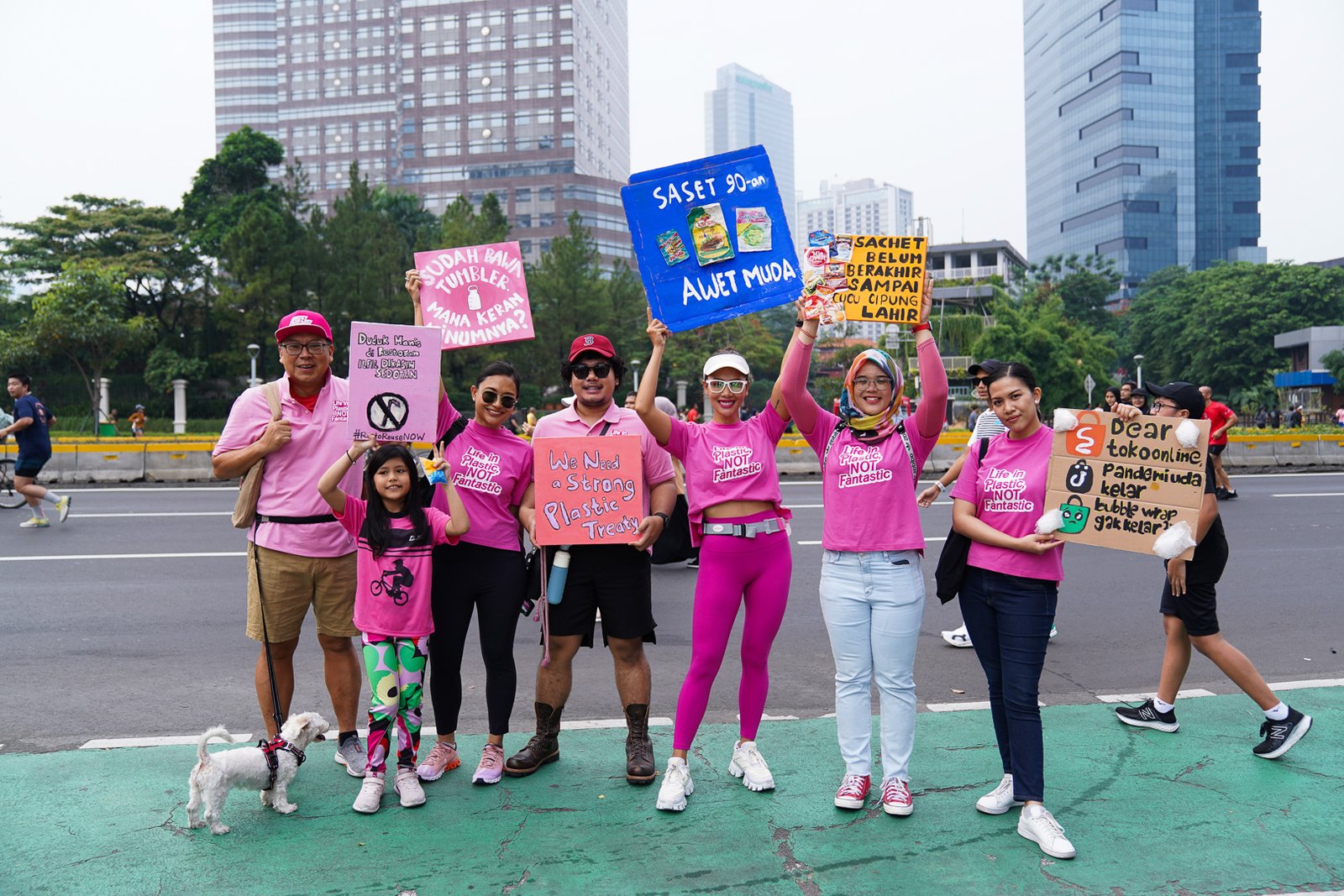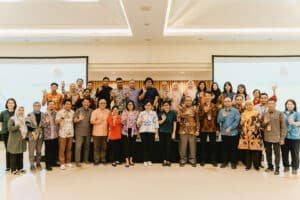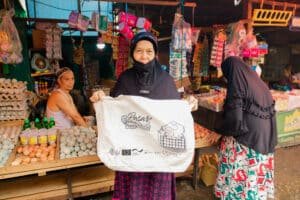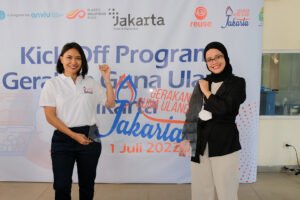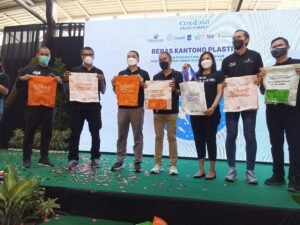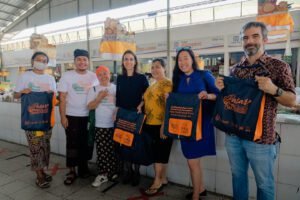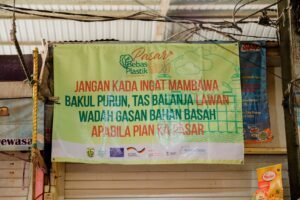Jakarta, July 27, 2023. The year 2023 marks the fifth year of the #PlasticFreeJuly campaign by various organizations and communities in Indonesia through a collective campaign called the Plastic Free March. This collective movement aims to realize a plastic-free future through various systematic efforts ranging from policies to limit plastic production, ban single-use plastics, expand producer responsibility to transition to a circular economy.
In recent years, there have been many initiatives from the community to implement a zero-waste lifestyle such as reducing the use of single-use plastics, sorting waste from home to community participation in cleaning up plastic waste in rivers, coasts and oceans. These efforts have yet to solve the problem of plastic pollution. Plastic pollution to the environment and the closure of landfills due to overloading of waste such as plastic have not been successfully resolved.
There are three demands urged by the initiators and collaborators of the 2023 Plastic Free March to address the issue of plastic pollution and realize a plastic-free future. First, to encourage the government to ban single-use plastics and encourage reuse as a solution. Currently, there are more than 100 regencies/cities and provinces that have banned the use of single-use plastics. Through the policy of banning the use of single-use plastics, it is expected that there will be a significant reduction in plastic waste, especially in single-use plastics such as shopping bags, straws and styrofoam. On the other hand, there must be a policy to accelerate the reuse ecosystem as a sustainable solution.
“One of the advocacies currently being carried out by community groups is about reuse solutions, this solution has actually been a habit of Indonesian society for a long time. However, with the times and changes in consumption behavior, concrete efforts are needed from the government and producers to jointly create a reuse ecosystem. If this ecosystem is realized and implemented by the entire community, Indonesia can also become an example of a country that practices this solution, in line with the expectations in the Global Plastic Treaty that is being drafted by UN member states to end plastic pollution,” said Tiza Mafira, Executive Director of the Indonesian Plastic Bag Diet Movement.
The second demand is to encourage the government to improve the waste management system. This includes corrective measures such as implementing policies based on the waste management hierarchy, implementing waste reduction policies in balance with waste management, increasing waste management budgets and infrastructure and supporting the development of reuse ecosystems and involving informal workers such as waste pickers in the transition to a circular economy.
“Improving good waste management from planning, implementation, control and evaluation is the key to the structural problem of waste and plastic pollution. So far, good waste governance has not been running because of several things such as waste management planning that is not based on comprehensive studies and the lack of evaluation of ongoing programs,” said Abdul Ghofar, WALHI National Pollution and Urban Campaigner.
The last demand is to encourage producers and businesses to take responsibility for post-consumption waste. This involves reducing the use of single-use plastics, using environmentally friendly packaging, and implementing obligations to expand producers’ responsibilities, such as recycling or waste management of their products. So far, 42 manufacturers have submitted their roadmaps for reducing waste in their packaging products to the Ministry of Environment and Forestry.
“FMCG producers play an important role in preventing waste generation, individual action is also necessary, but changes in the system of how products are distributed to consumers will have a significant impact,” said Atha Rasyadi, Urban Campaigner of Greenpeace Indonesia.
The series of Plastic Free March 2023 activities have started since the beginning of July with the agenda of the Global Plastic Treaty discussion, thematic discussion on plastic pollution, screening of the Plastic Island film and campaign poster workshop. The peak agenda of the 2023 Plastic Free March will be held on Sunday, July 30, 2023 in the form of a public campaign in the Jakarta Car Free Day area. This series of campaigns is a means of mainstreaming the environmental agenda, especially waste and plastic issues in the discourse of the 2024 democratic party.
Contact person:
Muharram Atha Rasyadi, Urban Campaigner Greenpeace Indonesia
08111-714-083
Adithiyasanti Sofia, Indonesia Plastic Bag Diet Movement
0811-2441-901
Abdul Ghofar, WALHI National Urban Campaigner
0821-1200-1871
Plastic Free March
Pawai Bebas Plastik is a collective campaign movement that aims to reduce the use of single-use plastics and encourage better handling of waste, especially plastic waste. This movement was first initiated by several environmental organizations such as Divers Clean Action, EcoNusa, Indonesia Plastic Bag Diet Movement, Greenpeace Indonesia, Indorelawan, Pandu Laut Nusantara, Pulau Plastik, and WALHI in 2019.
An overview of the Plastic Free March can be accessed here.
| Inisiator : | |
| 1 | Divers Clean Action |
| 2 | Indo Relawan |
| 3 | Indonesia Diet Kantong Plastik |
| 4 | Greenpeace |
| 5 | Walhi |
| 6 | Econusa |
| 7 | Pulau Plastik |
| 8 | Pandu Laut Nusantara |
|
Collaborators: |
|
| 1 | Kalbis Care Share |
| 2 | Trash Hero Jakarta |
| 3 | Bem Uhamka |
| 4 | Teras Hijau Sumatera |
| 5 | Cleanomic |
| 6 | Trash hero Ende |
| 7 | Aliansi Zero Waste Indonesia (AZWI) |
| 8 | PPLH Bali |
| 9 | Pedestrian Jogja |
| 10 | Koalisi Pejalan Kaki |
| 11 | Kanca Taman Jogja |
| 12 | WALHI SULBAR |
| 13 | World Cleanup Day Indonesia |
| 14 | Sahabat lingkungan (saling.id) |
| 15 | Cleanomic |
| 16 | Trash Hero Jakarta |
| 17 | Aliansi Mahasiswa Nusantara |
| 18 | Teens Go Green Indonesia |
| 19 | Sahabat Hijau |
| 20 | Clean Action Network |
| 21 | tumbuhijaurban |
| 22 | Ocean Defender Indonesia |
| 23 | Ayo Less Waste (ALW) |
| 24 | kitadibumi |
| 25 | GoMuda (Golongan Pemuda) Indonesia |
| 26 | Bukit Buku (Reading Club for Campaigning Climate Crisis via Fiction) |
| 27 | Pejuang Lestari |
| 28 | Kita di Bumi |
| 29 | Indonesian Youth Council For Tactical Changes |
| 30 | Lembaga Konservasi Mangrove Indonesia |
| 31 | GSSI |
| 32 | Seasoldier |
| 33 | Selaras Dengan Bumi |
| 34 | SayaPilihBumi |
| 35 | Sea Soldier Jakarta |
| 36 | DPC GERAKAN MAHASISWA NASIONAL INDONESIA KABUPATEN TANGERANG |
| 37 | Lembaga Bantuan Hukum Pijar Harapan Rakyat |
| 38 | ECOLLABO8 |
| 39 | Blue Haven Indonesia |
| 40 | Khayalan Arts |
| 41 | Paias.id |
| 42 | Community of Marine Conservation (CMC) Acropora |
| 43 | Climate Defender |
| 44 | Bank Sampah Budi Luhur |
| 45 | WateryNation |
| 46 | Independen |
| 47 | Komunitas Gerakan Cinta Guna Ulang |

